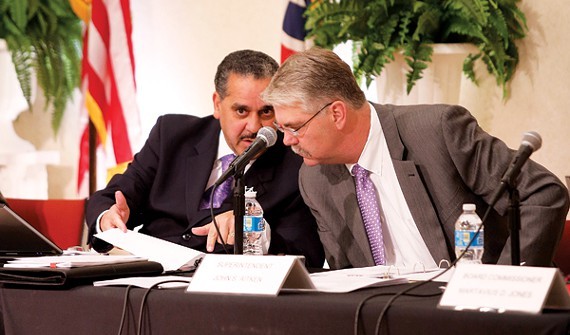John Aitken could be the most heavily recruited big guy from around here since Penny Hardaway, and the former Shelby County schools superintendent hasn’t worn a basketball uniform in years.
We are in the era of free agency in primary and secondary education. Who could have predicted three years ago that Aitken and Kriner Cash would be out and Willie Herenton would be back in? Nobody, but with Aitken’s buyout last week, Herenton, who will lead a group of charter schools, is the only person in this game with experience as a school superintendent.
 Justin Fox Burks
Justin Fox Burks
And what a game it is, with the Unified School System, charter schools, private schools, the Achievement School District, and probable future municipal school districts. Conference realignment in college sports looks simple by comparison.
Tuesday’s Unified School Board meeting was the first one Aitken has not attended since this saga began in 2010. If he decides to get back in the game, Aitken would be an attractive catch because of his experience as a coach, teacher, principal, and superintendent in the Shelby County system. It is hard to imagine anything anyone anywhere could throw at him that he hasn’t seen.
Free agency used to refer to professional sports, when players finally got the right to negotiate contracts with any team. When I was a boy, my favorite pro athletes were bound to their Detroit masters. I remember when Al Kaline, a Hall of Fame baseball player, finally earned the headline-making sum of $100,000 a year. If he had been born 30 years later, he could have added two zeroes to that.
In college football and basketball, star coaches like John Calipari hop from school to school, players (excuse me, “student athletes”) go pro after a year, and universities jump from one conference to another. The University of Memphis, which is leaving Conference USA, is reportedly willing to renegotiate its $800,000-a-year contract with Josh Pastner to keep him as basketball coach.
Free agency has come to private and public elementary and secondary schools, where the top salaries are lower but the stakes and budgets are higher. Tennessee is the national laboratory for school experimentation, and Memphis is the test kitchen.
This is the big churn. Teachers, principals, administrators, and students — especially talented minority students — will have more options than ever if there are municipal school systems and tuition vouchers for private schools. Some local private schools already pay more than $2 million a year in grants and scholarships. Charter schools and the Achievement School District are the sweet spot for hundreds of Teach For America teachers and alumni. Herenton, who predicted the break-up of the public school monopoly 20 years ago, will get his share of teachers and students.
Not everyone will get a better deal, of course. There will be some have-nots after the shakeout. Depending on how willing they are to raise taxes and how much they have to pay for their buildings, the chances of long-term survival for all six proposed Shelby County suburban school systems could be slim. Some of the charter start-ups will likely merge or fail. It took influential backers to save the Memphis Academy of Science and Engineering charter school this year, and that is one of the longer-running ones.
There was a time when public schools and private schools were separate realms for the most part. That is no longer so. Go to a game or concert at one of the private schools and you will see athletes and talented students who formerly went to city or county schools and either opted out or were recruited and given a scholarship. One of the most notable Memphis private school products is Michael Oher, the star football player and reclamation project in the movie The Blind Side. Oher graduated from Briarcrest Christian School. The Briarcrest principal, Steve Simpson, formerly worked for Memphis City Schools and in Hernando.
There are big bucks for public education from local and national foundations. And money usually comes with strings attached — a voice in policy. We are seeing that in Memphis with the Gates Foundation grants and the debate Tuesday over paying teachers based on student test performance or teacher experience and educational degrees.
The search is on for a new superintendent. If form holds, there will be a public hue and cry about the “six-figure salary package.” Cash was making $290,479 a year. Principals in MCS make up to $112,000. “We may have to pay up,” said board member David Pickler. “And include combat pay.”